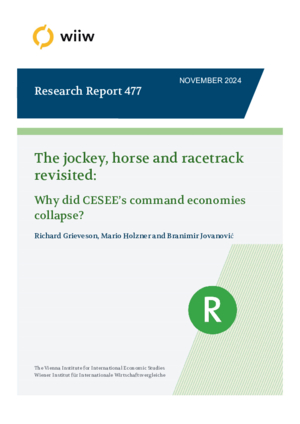The jockey, horse and racetrack revisited: Why did CESEE’s command economies collapse?
Richard Grieveson, Mario Holzner and Branimir Jovanović
wiiw Research Report No. 477, November 2024
57 pages including 8 Tables and 25 Figures
Why did the socialist system that dominated Eastern European countries for much of the 20th century collapse around 1990? Drawing on the newly released wiiw COMECON Dataset and reports that the wiiw was publishing at that time, we explore whether the collapse was due to unfixable systemic flaws of the socialist economies, an unfavourable global environment since the mid-1970s, or policy mistakes made by socialist leaders. Our analysis concludes that all three factors contributed to the collapse. Although the international context – with rising oil prices and interest rates – and the limited openness and competitiveness of socialist economies presented significant challenges, these economies might have survived without the sharp rise in borrowing during the 1970s, the Soviet Union’s squandering of the oil windfall between 1973 and 1985, the failure of Gorbachev’s reforms in the late 1980s, and exchange rate mismanagement in Hungary, Poland, Romania and Yugoslavia. A particularly grave policy mistake was the Soviet Union’s 1975 decision to replace the fixed five-year oil pricing system with one based on annual adjustments using a five-year moving average tied to world market prices, which exposed the COMECON countries to the full force of the 1970s energy crisis, thereby triggering – or at least catalysing – the system’s collapse. Finally, we also find that extreme weather events played a significant role by causing crop failures, which led to a loss of hard currency export revenues and subsequent current account issues.
wiiw COMECON Dataset:
https://comecon.wiiw.ac.at/
Keywords: socialism, communism, COMECON, Eastern Bloc, collapse, systemic deficiencies, international environment, policy mistakes, climate crisis, energy crisis
JEL classification: N14, P20, P24, P27
Countries covered: Bulgaria, CESEE, CSSR - Czechoslovakia, East Germany, Hungary, Poland, Romania, USSR - Soviet Union, Yugoslavia
Research Areas: Macroeconomic Analysis and Policy, International Trade, Competitiveness and FDI
